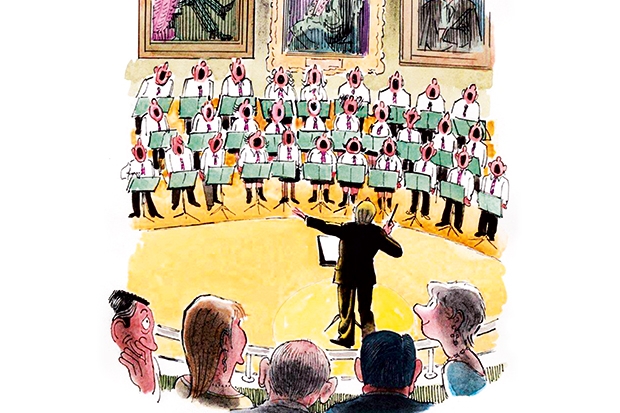Boys, by Edward Bell
Boy or girl, it isn’t easy being a full-time chorister, but the rewards are vast. For me, it was a good two years before the homesickness fully dissipated, and I was a veteran nine-year-old before I started really having fun. A year later the school became co-ed and our elite band had to adjust to the sudden arrival of girls. For a brief moment I thought they were even going to infiltrate the ranks of the choir. I couldn’t articulate why, but I remember thinking that would have been a bad thing.
Very aware of the limitations of my own voice, I developed an obsession with the voices of others. Singing with the girls at school, I noticed that while their voices lacked the individuality of boys’ voices, they had a natural purity and sounded cleaner. There’s a lot to be said for that purity. I’d postulate that — for trained singers — girls’ voices blend more naturally than boys’. Beyond that there really isn’t much between the two. It’s like being asked to comment on the difference between two types of Rioja. Many can’t and, as per girls and boys voices, wouldn’t notice if you mixed the two together.
Chris Gray, director of music at Truro Cathedral, is in the process of setting up a girls’ choir and says the difference between voices reminds him of the Pepsi Challenge, but that despite the vocal similarities Truro’s choirs will sing separately. Truro’s girls’ choir will be drawn from 13- to 18-year-olds since, as Gray says, it makes sense to work with emotionally maturing young women, rather than girls. Voice breaks mean that boys, on the other hand, must be trained from a comparatively immature age. Given the vast difference in rehearsal needs between a seven-year-old boy and an 18-year-old woman, the decision to keep the choirs separate is understandable.
Even if mixed choirs aren’t going to be a reality yet for our top cathedrals, it’s right to encourage girl choristers. Britain has a strong choral tradition, which has been going for longer than you’d think. The midpoint between now and when my old school started to educate boy trebles for the choir at Windsor Castle predates Haydn and Bach being born. Astonishing when you think about it.
Girls, by Camilla Swift
Until the age of eight I attended a very nice school for little girls, in Windsor. We wore pinafores and cardigans; straw boaters in the summer, felt ones in the winter, and when there was a state visit to Windsor Castle we all lined up along the Long Walk, like the well-behaved little girls we were (well, sometimes at least). Then everything changed. Our local choir school, after 644 years of educating young boys, decided to admit girls, and I became one of their first ever intake.
My new school was very different. The houses were named after Royal Navy ships, Latin grammar was taught from the age of eight and blackboard rubbers were regularly thrown around the classroom. Slowly but surely the school adjusted to girls. We got our own PE teacher, which meant we no longer played football and cricket with the boys, and in my final year we even got our own dormitory.
But there was one aspect of the school where girls were never going to be accepted; the choir. In every year group there were six or so boys who wore a red tie rather than a blue, all of whom boarded. They got up early every morning for choir practice, practising again every afternoon before their Evensong service.
While they did that, we ‘supers’ — as non-choristers were called — had plenty of other things to do. German lessons while the choristers did their morning practice, and prep and after-school activities during the school day, while they had to do theirs after Evensong. But perhaps most important musically, we also had our own choir, which girls could join, and sang at places including Long-leat House, St Bartholomew the Great, Windsor Castle, and Eton’s Sunday chapel services.
Was being persona non grata in the choir proper such a bad thing? I think I did jolly well by it. The musical experience I gained served me in good stead all the way to music A-level and Grade VIII singing. I didn’t miss out on German classes or after-school activities, and although our choir didn’t have the prestige of the Chapel Choir, it was a far sight better than most school choirs. Perhaps some girls will still feel left out by being prevented from auditioning by their sex, and no, it’s not ‘gender equal’. But rightly or wrongly, I don’t think that’s a bad thing.







Comments